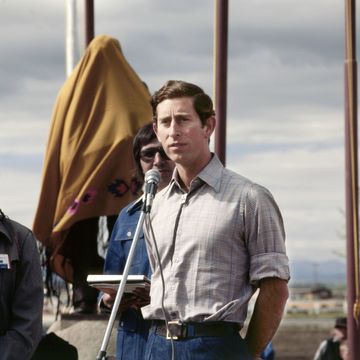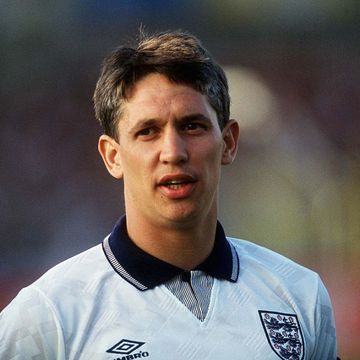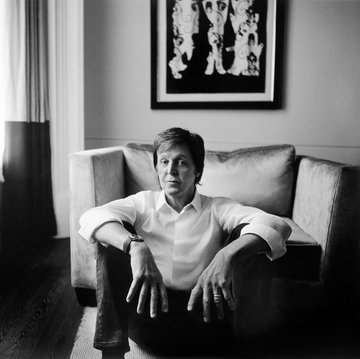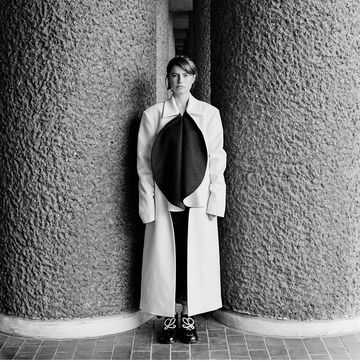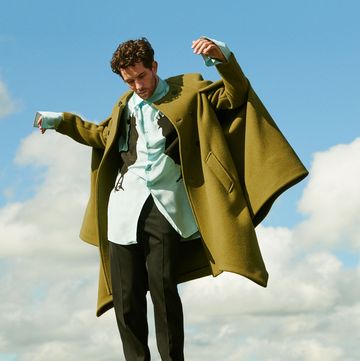Admit it. Even as your eyes are skimming over these words, your brain is tugging at your trouser leg like an excitable Jack Russell. "Hey!" It's saying. "Hey! Yeah, you! You sure you want to read this? You sure there isn't something else you could be doing? Like reading a couple of pages of the new le Carré? Or listening to that new LCD Soundsystem record? Or checking out a Malcolm Gladwell podcast? How about booking tickets to the Jasper Johns show? Or sneaking in a cheeky episode of that new Mitchell and Webb comedy? Or hey, there's always, you know, staring out of the window of the train in a paroxysm of indecision before resorting to Facebook. Come on, you know you want to! Ooh is that a stick…?"
Welcome to culture in the 21st century, folks. As far as entertainment to be watched, read and listened to goes, it feels like we've never had it so good, so cheap, and so often. Often, certainly: a recent report by the Institute of Practitioners in Advertising (IPA) revealed that adults are spending almost eight hours a day immersed in media, helped in no small part by the fact that right now we've all got smartphones burning holes in our pockets (and — here's hoping! — not simultaneously beaming cancer into our thighs). We can consume culture almost anywhere and at any time, so there are no excuses not to be up on what's on, what's out, and what's hot. (The report also found that for a large chunk of us, checking our phones is the first thing we do in the morning and the last thing we do at night.)
Despite the creative industries having undergone various threats in the digital age — Streaming! Piracy! Millennials! — there still seems to be a lot of culture about in Britain. Earlier this year, the Publishers Association announced that sales of books and journals had reached a record level of £4.8bn in 2016. Last year's "Measuring Music" report found that in 2015, 27.7m of us attended concerts in the UK, and despite continued falling sales in traditional formats, streaming services earned £251m in revenue, up from £168m the previous year (also, bonus chest-swelling fact: thanks to the likes of Ed Sheeran, Adele and Coldplay, in 2015 one in six albums sold across the world was by a British artist). Ten years since podcasts came onto the scene, 4.7m adults now listen to one, while the last few months of 2017 saw the second biggest ever audience for live radio, with 46.68m listeners recorded by monitoring body Rajar. And as for telly? Well, where do we start?
Probably with Netflix, which announced this year that 100m people now subscribe to its services globally. But there are, of course, also the other streaming services vying for our attention, such as Amazon Prime Video right through to specialist movie sites such as Mubi and Curzon Home Cinema, not to mention Sky, cable and the traditional terrestrial channels. Last year, John Landgraf, head of the FX Network in the US, the broadcaster whose successes have included Sons of Anarchy, The Americans and Prison Break, caused a fuss in the industry when he predicted that by the end of that year, 430 to 450 new scripted shows would have aired or streamed in America, the most ever. (According to FX Networks Research, it ended up being 455.) This year, some are predicting it will hit 500.
Let us not forget that with great choice comes great responsibility: with so many options of ways to be enlightened and/or entertained, how do we know that we're picking right? At an international arts and culture symposium at Soho House Istanbul a couple of years ago, the British film director Mike Figgis gave a speech in which he railed against the deluge of poor quality entertainment that this era has seen fit to provide: the onslaught of material — or to use the word despised by any lifer print journalist, "content" — that competes for our attention. "How do you help people find the good stuff and avoid the other 99.9 per cent of garbage that's out there that will drag your attention, drag your time?" he asked. "I know we're living longer, but it's still short, life." Well Mike, the answer is you employ someone like me.
I write and edit the Culture section of Esquire magazine which, if you're a regular reader, you might know usually lurks between the Style section and the full-length features (not this month though: it's the whole issue!). Getting paid to consume culture is pretty dreamy, and there's not a moment when I trot off to a 10am film screening in a private cinema with squishy seats in a posh Soho hotel when I don't give a thumbs-up to the Big Guy, but if you find the barrage of culture a little too much, take it from me that I know how you feel and then some. (I recently came back from holiday to find 81 books on my desk sent to me by publishers for possible inclusion in this magazine which, if I'd read them all at a rate of two minutes per page, and assuming an average book-length of 300 pages, would have taken me 34 days not allowing for sleep or meals, or for the fact that one of them is Simon Schama's Belonging: The Story of the Jews 1492–1900 which is 800 pages long and would take a day and night on its own.)
Like you, I've had to make a call about what to invest in, but with an added nagging sensation of it being my actual job to know this stuff. To stick or not to stick with Game of Thrones, ploughing through the mid-run quagmire in order to enjoy the heady delights of the recent season six and be armed and ready for next year's season seven? (I have to confess that, like my Ramsay Bolton-shtupping GoT namesake, I didn't make it past series five.) To be a true cultural aficionado, don't you have to have watched all of Breaking Bad? The Sopranos? 24? House of Cards? The West Wing? The Wire? Homeland? Six Feet Under? Lost? The Americans? The Walking Dead? If you can say you have, have you also consulted a health professional about your levels of Vitamin D? (In my case — and with the exception of The Sopranos, which I would happily watch once a week, and The Walking Dead which I've never seen so as far as I'm concerned Andrew Lincoln is still Egg from This Life — the answer is I've seen, er, some. And I keep Vitamin D pills in my desk drawer.)
We're all feeling the strain. Vanity Fair's cultural critic James Wolcott, who used to focus solely on TV, voiced his consternation about the televisual cornucopia in deliciously florid fashion in a piece that ran in the December 2015 issue of that magazine: "Were I to resume TV reviewing as a dedicated endeavour," he wrote, "I would have to set aside my Captain Video helmet of yore and acquire six sets of auxiliary eyeballs tendrilled to Hillary Clinton's private server just to keep up with the kaleidoscopic bombardment of too much creativity for one mortal mind to handle."
Even those who stand to profit from this bounty are showing concern. After having declared 2016 the year of "peak TV", FX's John Landgraf then revised his prediction to say that the volume wouldn't start to decline until 2019, and that that was no good thing: "There is so much US television [that] we've lost much of the thread of a coherent, collective conversation about what is good, what is very good, and what is great."
Not only are our critical faculties dulled by the onslaught, but this excess of choice itself could be less of a giant leap for mankind than we might think. In a paper snappily titled "The tyranny of choice: a cross-cultural investigation of maximizing-satisficing effects on well-being" published in 2012 in the journal Judgment and Decision Making, psychologists Arne Roets, Barry Schwartz and Yanjun Guan looked at how the proliferation of choice in all areas of life had affected happiness. They identified three problems: initially, we feel burdened with the information-gathering required before making our choice; next, because of the higher expectations prompted by such a wealth of options, we are more likely to feel dissatisfied with our selection; lastly, because we're aware we were given such a wide choice in the first place, we feel that the fact we have made an "incorrect" selection can only be our own fault, and are swamped with regret.
"These problems have become especially relevant in contemporary western societies," write the authors, "where people are overwhelmed by near-unlimited options in all domains of life[...] people in western societies feel increasingly uneasy about their life decisions because they are unsure about whether they are making the right choices, and this 'excess of freedom' has resulted in a dramatic increase in people's dissatisfaction with their lives and even in clinical depression."
Of course, the paper wasn't talking specifically about television, though the model certainly applies; it seems equally pertinent to dating, shopping, or deciding which restaurant to go to on a Thursday night. But as it happens I'm still waking up in a cold sweat over the fact that two issues ago I plumped for writing about Tim Roth as a middle-aged-man-cum-secret-badass in the Sky Atlantic series Tin Star over Jason Bateman as a middle-aged-man-cum-secret-badass in the Netflix series Ozark (I only had room for one!) and the last thing I'd want is for my inability to select the very best middle-aged-man-cum-secret-badass on TV in a given month to drag you down with me into a depressive spiral.
But the real sadness of all this all-too-available culture is not that it frazzles our brains, or hoovers up our monthly data plans, or stops us offering our seats to pregnant ladies on the tube (seriously people, look up once in a while!), but that one of the most fun things about consuming culture — being able to talk about it afterwards — just isn't possible. How many times have you asked or been asked "Have you seen The Leftovers?" or "Did you listen to S-Town?" only to be told, "No, we're giving Mr Robot a try," or "Right now, I'm actually reading War and Peace." (Ha! Just kidding.) Even if we have watched the same shows, or listened to the same podcasts, or read the same articles, we're unlikely to have done it at the same time. The water-cooler moment is officially dead, and we're staggering around with our arms outstretched trying to reach each other — which, if I'd ever seen it, I might be able to turn into a pretty neat-o The Walking Dead analogy — but we're no longer able to make a connection. For what it's worth, the IPA survey that analysed how much media we consume daily also noted that we're spending more time at home, and alone.
But, of course, I still have a job to do and you still have needs to be met. So in this article, you'll find a selection of recommendations of things happening between now and the end of the year that, in this heavily crowded cultural arena, are still a worthwhile use of your time. (And hey! Why not invite a friend?) Because despite the overwhelming flood that Mike Figgis described — and if you can abide the stretched analogy — there are still times when you come across the cultural equivalent of a cat clinging to a floating refrigerator that can bring you great and unexpected joy. In my 10 years of doing this job, there have been plenty of highlights, among them hearing the transcendent beauty of Bon Iver at St Giles-in-the-Fields; discovering the simmering intensity of Evie Wyld's debut novel, After the Fire, a Still Small Voice; and the part-horrified, part-delighted squeals of a room full of male film critics catching their first glimpse of Magic Mike.
Hopefully, you might find a few bedraggled kitties here, and where the materials were available they have been read, watched, listened to and researched in order to spare you a little bit of "did-I-choose-right?" brain-fry, and just as long as we ignore the fact that they are contained in a magazine which is itself just one of the "content platforms" (hell's bells!) in your life which is currently competing for your attention. But, of course, one thing I can in my capacity as a cultural lock-keeper tell you that you really don't need to be spending any of your time on right now is reading this piece. Which wisely, at this point, you're not.
The 21 Things You Need To See, Read, Hear And Visit This Winter

Miranda Collinge is the Deputy Editor of Esquire, overseeing editorial commissioning for the brand. With a background in arts and entertainment journalism, she also writes widely herself, on topics ranging from Instagram fish to psychedelic supper clubs, and has written numerous cover profiles for the magazine including Cillian Murphy, Rami Malek and Tom Hardy.



